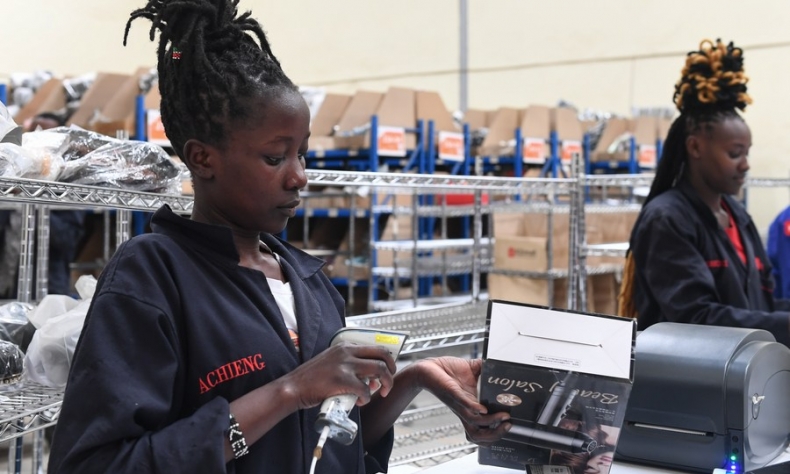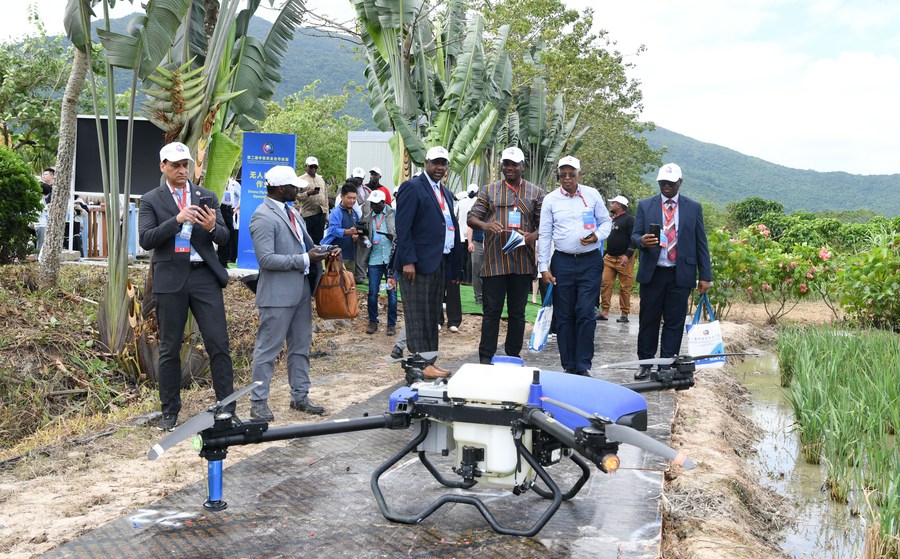Digital Empowerment

Africa has achieved tangible results in building digital infrastructure, applying new technologies, promoting smart agriculture and e-commerce trade, and training African digital talents for future work. These are proof that China has kept up with building infrastructure in Africa.
Given the rate at which youth population in numerous African countries is growing, the continent promises to emerge as a major consumption market in the coming decades. More than 70 percent of Africa’s population is under the age of 35, and by 2030, 42 percent of the world’s young people are expected to reside on the continent. This data points to the potential the continent has to quickly industrialise, develop its economic scale, and innovate in order to compete on a global scale.
For this to happen, where the continent can compete in the world market and generate good jobs for the over 20 million Africans joining the workforce each year, digital technologies such as artificial intelligence (AI) will be critical, in order to help African countries to leapfrog the slow and expensive grind of industrialisation, while providing access to meaningful jobs with better pay.
African countries lack comprehensive policy framework to close the development gap in digital economy such as AI and green technologies, which is also a factor behind the unbalanced global economic recovery. In Agenda 2063: The Africa We Want, a long-term people-centred “blueprint and master plan for transforming the continent of Africa,” the African Union has pledged to promote digital economy, which is seen as essential to bringing new opportunities for African people, including employment and business development. The digital economy is a tool that can help African people to fulfil their aspirations.
Closing gaps
China has always positioned itself as a willing and reliable partner to support African countries to address their pressing socioeconomic challenges. China is building a community of shared future for mankind, and has rolled out its signature Belt and Road Initiative (BRI) for connectivity and infrastructure development. African Union believes that joining hands with China to speed up the development of digital economy will help to close the development gaps and inject more impetus into the African economic recovery.
China’s tech cooperation with Africa has made progress in recent years, with China proactively implementing tech innovation action plans under the BRI and sharing sci-tech achievements and experience with many African countries. China has committed to 10 digital economy projects for Africa in fields such as communications networks, data centres, and smart cities. The country has also pledged to set up centres for China-Africa cooperation in satellite remote-sensing applications and support the development of Africa-China joint laboratories, partner institutes, and scientific and technological innovation cooperation bases.

The China-Africa Cooperation Vision 2035, adopted at the Eighth Ministerial Conference of the Forum on China-Africa Cooperation in Senegal in 2021, reaffirmed the digital cooperation and expanded it to areas such as spectrum management, 5G technology, satellite Internet, big data, e-commerce, smart cities and financing. In Africa’s technology sector, China’s role is seen as both of a financier and infrastructure provider.
In recent years, China has played a significant role in supporting the surge of Africa’s Internet access. In fact, China is one of the major funders of ICT infrastructure in the continent, where Chinese firms are actively investing in African countries to build digital infrastructure, offer vocational training for local people and provide Internet service. China’s approach is unique in that it encourages China’s major tech firms such as Huawei and ZTE to develop local experience of Africa’s ICT space by building relationships and partnering with domestic Internet service firms.
For instance, in Nigeria, Huawei partnered with MTN to provide the first 5G service, enabling users of Huawei and Xiaomi phones to be the first users of the services, earlier than other brands such as iPhone or Samsung. In Kenya, Huawei is working with Kenya’s largest telecoms provider, Safaricom, to implement 5G services, develop ICT talents, and train public service officials on digital skills.
Increasing engagement
Despite Western barriers to China’s technology development, China continues to expand the influence of its top technology companies in Africa. In 2020, when the US government announced its Clean Network Initiative, targeted at limiting Huawei’s 5G technology worldwide, no African country agreed to join it. This cooperation of shared future between China and Africa is the reason why Chinese tech firms continue to have an increasing level of influence in Africa and signing numerous bilateral agreements.
All these bilateral pacts enabled Huawei to establish an academy in Uganda relating to information and communications technologies, aiming to introduce technologies such as 5G, artificial intelligence, and big data into the country. The academy trains over 2000 technical personnel for the African country each year. Huawei has also deployed the first RuralStar Lite base station in Zambia, providing wireless network services in remote rural areas of the country. The courses in the above programs are aimed to inspire local talent, enhance knowledge sharing, promote a greater understanding of, and interest in, the information and communication technology sector, and encourage participation in the digital community. The course focuses on the latest technologies like 5G, cloud computing, artificial intelligence and the internet of things. The US on the other hand, has historically lacked a similarly coordinated digital partnership in Africa, at least not until December 2022, when the Biden administration announced a new partnership – the Digital Transformation in Africa initiative that would see American government invest about $300 million and facilitate about $450 million financing for Africa’s digital development.

Furthermore, China has helped Africa to make headway in the area of drone technology. Drone technology from China has empowered the development of smart agriculture in African countries like Mozambique, South Africa and Ghana, supporting the continent’s digital transformation in agriculture. In Mozambique, the Wanbao Mozambique Agricultural Park saw a 13.6 percent increase in crop yield with the use of drones and other high-tech innovations for three consecutive years. Local farmers have used drones to significantly increase productivity, supply and varieties of food, contributing to food security.
Africa has achieved tangible results in building digital infrastructure, applying new technologies, promoting smart agriculture and e-commerce trade, and training African digital talents for the future work. These are proof that China has kept up with building infrastructure in Africa. A white paper released by China’s State Council Information Office in November 2021 revealed that Chinese companies have cooperated with major African operators in achieving full basic coverage of telecommunications services on the continent.
Over half of the African continent’s wireless sites and high-speed mobile broadband networks are built by China. More than 200,000 km of optical fibre cables give broadband Internet access to hundreds of millions of local people. Between 2000 and 2020, China has invested over $13.5 billion in Africa’s ICT sector. This shows China’s belief that digitalisation can foster the creation of new meaningful jobs while also developing African countries’ human capital base, thereby helping the continent of Africa achieve its demographic dividend and avoid its demographic curse.
This is because the Chinese government believes that sincere cooperation between African nations and China will facilitate the formation of international consensus to establish more effective, extensively accepted, and comprehensive rules in the sector that will create a more stable environment for growth and global cooperation in digital economy such as AI. This is a significant move since digital economy is becoming a key area for global competition.
The author is Executive Director of Centre for Nigerian Studies, Institute of African Studies, Zhejiang Normal University.
 Facebook
Facebook
 Twitter
Twitter
 Linkedin
Linkedin
 Google +
Google +










